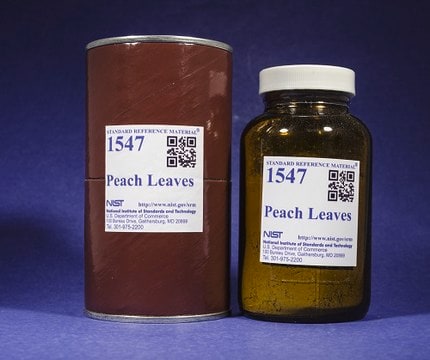NIST2786
Fine particulate matter
NIST® SRM® 2786, <4 μm
Sign Into View Organizational & Contract Pricing
All Photos(1)
About This Item
UNSPSC Code:
41116107
NACRES:
NA.24
Recommended Products
grade
certified reference material
Quality Level
packaging
pkg of 1 bottle
manufacturer/tradename
NIST®
application(s)
industrial hygiene
format
matrix material
Looking for similar products? Visit Product Comparison Guide
General description
This Standard Reference Material (SRM) is intended for use in evaluating analytical methods for the determination of selected polycyclic aromatic hydrocarbons (PAHs), nitro-substituted PAHs (nitro-PAHs), polybrominated diphenyl ether (PBDE) congeners, hexabromocyclododecane (HBCD) isomers, sugars, polychlorinated dibenzo-p-dioxin (PCDD) and dibenzofuran (PCDF) congeners, inorganic constituents, and particle-size characteristics in atmospheric particulate material and similar matrices. A unit of SRM 2786 consists of one bottle containing between 100 mg and 140 mg of particulate matter. For more information, please refer to the SDS and COA.
SRM 2786_cert
SRM 2786_SDS
SRM 2786_cert
SRM 2786_SDS
Application
- Pediatric respiratory health in sparsely populated areas: Research demonstrates that seasonal extreme temperatures and short-term increases in fine particulate matter significantly impact pediatric respiratory health in the intermountain western United States, underscoring the need for tailored environmental health strategies in rural settings (Landguth et al., 2024).
- Oxidative potential of PM2.5 in urban environments: A study identifies major source categories of PM2.5 oxidative potential in wintertime Beijing, utilizing online dithiothreitol-based field measurements to enhance understanding of air pollution dynamics and health risks in heavily populated urban areas (Cheung et al., 2024).
- Impact of fine particulate matter on COVID-19: Analysis in Bangkok during 2020-2021 links fine particulate matter and meteorological factors with the daily confirmed cases of COVID-19, offering insights into the complex interactions between air quality and public health crises (Sangkham et al., 2023).
- Global assessment of air quality risks: A comprehensive study provides a global status and risk assessment of PM2.5 and O3 pollution based on the new WHO air quality guidelines, proposing pathways to achieve better and healthier air quality worldwide (Liu et al., 2024).
- Personal exposure monitoring in elderly populations: This research focuses on the personal exposure of elderly residents to fine and coarse particulate matter in Hong Kong, employing exposure assessment models to evaluate individual health risks associated with urban air pollution (Lui et al., 2024).
Legal Information
NIST is a registered trademark of National Institute of Standards and Technology
SRM is a registered trademark of National Institute of Standards and Technology
related product
Product No.
Description
Pricing
Storage Class Code
13 - Non Combustible Solids
WGK
WGK 3
Flash Point(F)
Not applicable
Flash Point(C)
Not applicable
Certificates of Analysis (COA)
Search for Certificates of Analysis (COA) by entering the products Lot/Batch Number. Lot and Batch Numbers can be found on a product’s label following the words ‘Lot’ or ‘Batch’.
Already Own This Product?
Find documentation for the products that you have recently purchased in the Document Library.
Customers Also Viewed
Dong Chang Lee et al.
Toxics, 9(2) (2021-03-07)
Eupatilin is an active flavon extracted from the Artemisia species and has properties such as antioxidant, anti-inflammatory, and anti-cancer. We examined the effect of eupatilin using fine particulate matter (FPM) and human bronchial epithelial cell line (BEAS-2B) to confirm the
Our team of scientists has experience in all areas of research including Life Science, Material Science, Chemical Synthesis, Chromatography, Analytical and many others.
Contact Technical Service










